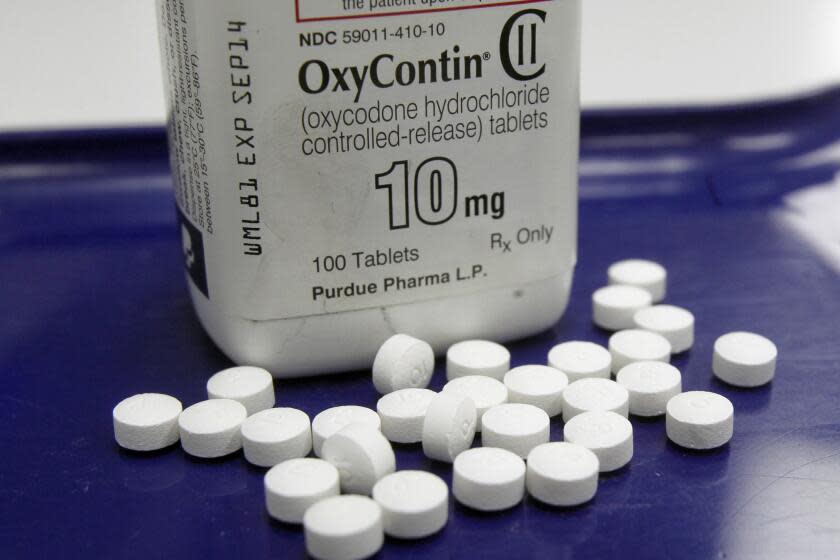Supreme Court upsets $10-billion opioid settlement because it shields the Sacklers

The Supreme Court on Thursday rejected a mass settlement related to the nation's opioid crisis that would have paid an estimated $10 billion to victims, hospitals, states and others, and shielded the Sackler family from further liability.
By a 5-4 vote, the justices ruled that a bankruptcy judge does not have broad power to arrange a mass settlement of thousands of claims that includes protections for people who are not bankrupt.
The justices were split in an unusual way. Justice Neil M. Gorsuch spoke for the majority, while Chief Justice John G. Roberts Jr. and Justices Sonia Sotomayor, Elena Kagan and Brett M. Kavanaugh dissented.
"Our only proper task is to interpret and apply the law as we find it; and nothing in present law authorizes the Sackler discharge," Gorsuch said.
"We hold only that the bankruptcy code does not authorize a release and injunction that, as part of a plan of reorganization under Chapter 11, effectively seeks to discharge claims against a nondebtor without the consent of affected claimants," Gorsuch continued.
Justices Clarence Thomas, Samuel A. Alito Jr. , Amy Coney Barrett and Ketanji Brown Jackson agreed.
"Today’s decision is wrong on the law and devastating for more than 100,000 opioid victims and their families," Kavanaugh said in dissent. "The court’s decision rewrites the text of the U.S. Bankruptcy Code and restricts the long-established authority of bankruptcy courts to fashion fair and equitable relief for mass-tort victims. As a result, opioid victims are now deprived of the substantial monetary recovery that they long fought for and finally secured after years of litigation."
Gorsuch and Kavanaugh are both conservatives, but they often disagree. Gorsuch often seems determined to follow the law as he sees it regardless of the consequences, while Kavanaugh is more likely to focus on the practical impact of the court's ruling.
The Sacklers, owners of the Purdue Pharma company, had denied wrongdoing but agreed to contribute $6 billion to the settlement fund if they would be protected from future lawsuits.
The case has been closely followed not just because of the opioid settlement but also because of the use of bankruptcy laws to settle other mass lawsuits involving the Boy Scouts of America and some Catholic dioceses.
Purdue Pharma filed for bankruptcy in 2019 facing thousands of lawsuits alleging its marketing of OxyContin as a nonaddictive pain relief pill had triggered an opioid epidemic that led to more than a half-million deaths since the mid-1990s. In the decade prior to the bankruptcy, the company had distributed about $11 billion to members of the Sackler family and their offshore accounts.
Their lawyers maintained that more than half of this amount was paid in taxes.
But the scale of the damage and the liability for OxyContin was extraordinary. A bankruptcy court later put a hold on new lawsuits, while the pending claims against Purdue Pharma and the Sacklers were estimated to seek in total more than $40 trillion.
A coalition of creditors, including victims, hospitals, local and state governments and tribal nations, negotiated a settlement that was expected to pay out about $10 billion. Most of the funding — about $6 billion — came from the Sacklers.
In 2021, a bankruptcy judge approved the settlement and described it as the "only reasonably conceivable" way to fairly resolve the mass of lawsuits. Without the money from the Sacklers, he said the company would be liquidated, leaving most of the creditors with nothing.
While more than 95% of the creditors said they approved the deal, including all 50 states, the Biden administration's bankruptcy trustee opposed it. He did so because the settlement shielded the Sacklers from any further or future liability.
In Harrington vs. Purdue Pharma, the trustee argued that the Sacklers were not bankrupt and therefore, cannot take advantage of the shield provided by a bankruptcy settlement.
Last year, the Supreme Court put the settlement on hold to consider that argument.
This story originally appeared in Los Angeles Times.


